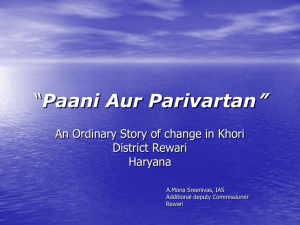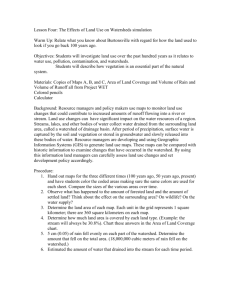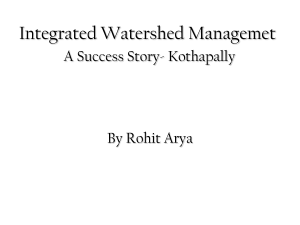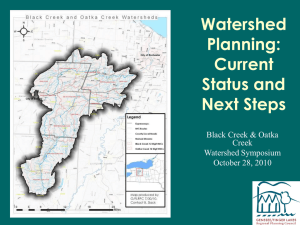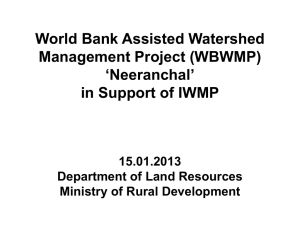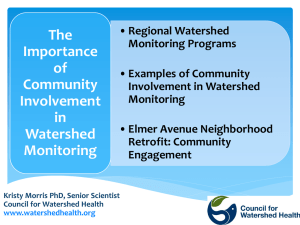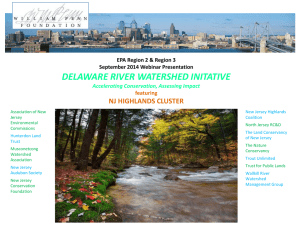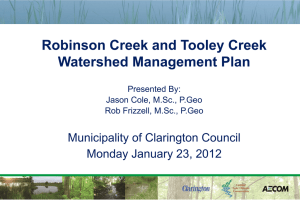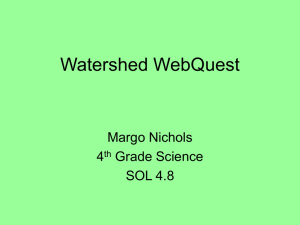Little Campbell River Watershed Groundwater Capacity Assessment
advertisement
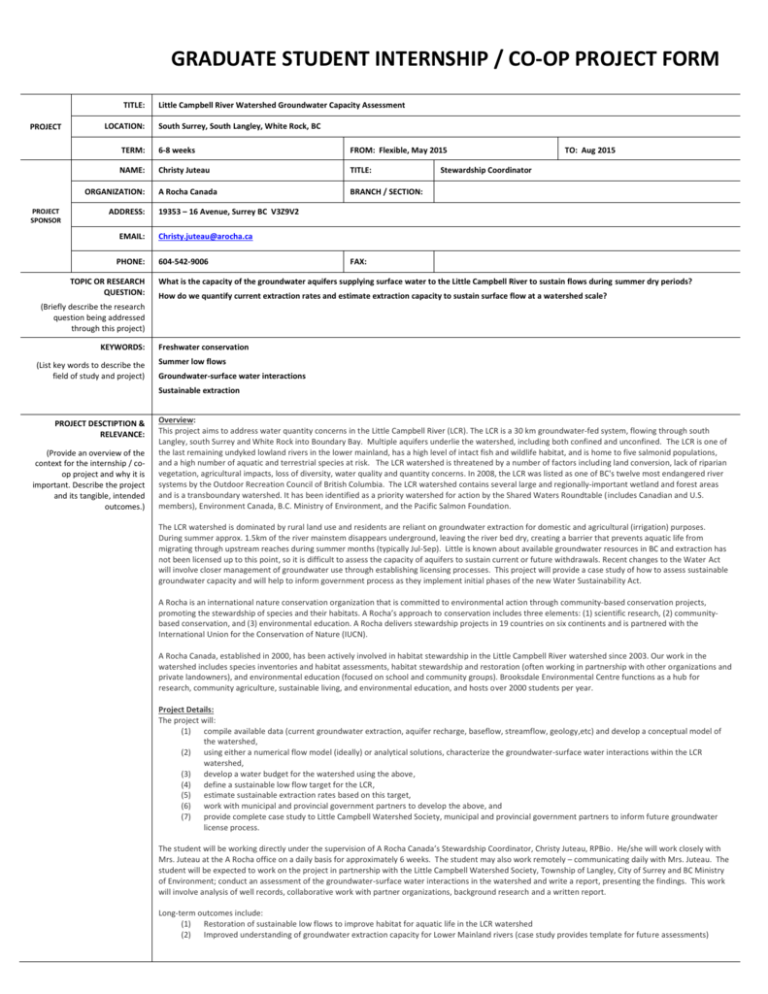
GRADUATE STUDENT INTERNSHIP / CO-OP PROJECT FORM TITLE: PROJECT LOCATION: South Surrey, South Langley, White Rock, BC TERM: 6-8 weeks FROM: Flexible, May 2015 NAME: Christy Juteau TITLE: A Rocha Canada BRANCH / SECTION: ORGANIZATION: PROJECT SPONSOR Little Campbell River Watershed Groundwater Capacity Assessment ADDRESS: EMAIL: PHONE: TOPIC OR RESEARCH QUESTION: TO: Aug 2015 Stewardship Coordinator 19353 – 16 Avenue, Surrey BC V3Z9V2 Christy.juteau@arocha.ca 604-542-9006 FAX: What is the capacity of the groundwater aquifers supplying surface water to the Little Campbell River to sustain flows during summer dry periods? How do we quantify current extraction rates and estimate extraction capacity to sustain surface flow at a watershed scale? (Briefly describe the research question being addressed through this project) KEYWORDS: (List key words to describe the field of study and project) Freshwater conservation Summer low flows Groundwater-surface water interactions Sustainable extraction PROJECT DESCTIPTION & RELEVANCE: (Provide an overview of the context for the internship / coop project and why it is important. Describe the project and its tangible, intended outcomes.) Overview: This project aims to address water quantity concerns in the Little Campbell River (LCR). The LCR is a 30 km groundwater-fed system, flowing through south Langley, south Surrey and White Rock into Boundary Bay. Multiple aquifers underlie the watershed, including both confined and unconfined. The LCR is one of the last remaining undyked lowland rivers in the lower mainland, has a high level of intact fish and wildlife habitat, and is home to five salmonid populations, and a high number of aquatic and terrestrial species at risk. The LCR watershed is threatened by a number of factors including land conversion, lack of riparian vegetation, agricultural impacts, loss of diversity, water quality and quantity concerns. In 2008, the LCR was listed as one of BC's twelve most endangered river systems by the Outdoor Recreation Council of British Columbia. The LCR watershed contains several large and regionally-important wetland and forest areas and is a transboundary watershed. It has been identified as a priority watershed for action by the Shared Waters Roundtable (includes Canadian and U.S. members), Environment Canada, B.C. Ministry of Environment, and the Pacific Salmon Foundation. The LCR watershed is dominated by rural land use and residents are reliant on groundwater extraction for domestic and agricultural (irrigation) purposes. During summer approx. 1.5km of the river mainstem disappears underground, leaving the river bed dry, creating a barrier that prevents aquatic life from migrating through upstream reaches during summer months (typically Jul-Sep). Little is known about available groundwater resources in BC and extraction has not been licensed up to this point, so it is difficult to assess the capacity of aquifers to sustain current or future withdrawals. Recent changes to the Water Act will involve closer management of groundwater use through establishing licensing processes. This project will provide a case study of how to assess sustainable groundwater capacity and will help to inform government process as they implement initial phases of the new Water Sustainability Act. A Rocha is an international nature conservation organization that is committed to environmental action through community-based conservation projects, promoting the stewardship of species and their habitats. A Rocha’s approach to conservation includes three elements: (1) scientific research, (2) communitybased conservation, and (3) environmental education. A Rocha delivers stewardship projects in 19 countries on six continents and is partnered with the International Union for the Conservation of Nature (IUCN). A Rocha Canada, established in 2000, has been actively involved in habitat stewardship in the Little Campbell River watershed since 2003. Our work in the watershed includes species inventories and habitat assessments, habitat stewardship and restoration (often working in partnership with other organizations and private landowners), and environmental education (focused on school and community groups). Brooksdale Environmental Centre functions as a hub for research, community agriculture, sustainable living, and environmental education, and hosts over 2000 students per year. Project Details: The project will: (1) compile available data (current groundwater extraction, aquifer recharge, baseflow, streamflow, geology,etc) and develop a conceptual model of the watershed, (2) using either a numerical flow model (ideally) or analytical solutions, characterize the groundwater-surface water interactions within the LCR watershed, (3) develop a water budget for the watershed using the above, (4) define a sustainable low flow target for the LCR, (5) estimate sustainable extraction rates based on this target, (6) work with municipal and provincial government partners to develop the above, and (7) provide complete case study to Little Campbell Watershed Society, municipal and provincial government partners to inform future groundwater license process. The student will be working directly under the supervision of A Rocha Canada’s Stewardship Coordinator, Christy Juteau, RPBio. He/she will work closely with Mrs. Juteau at the A Rocha office on a daily basis for approximately 6 weeks. The student may also work remotely – communicating daily with Mrs. Juteau. The student will be expected to work on the project in partnership with the Little Campbell Watershed Society, Township of Langley, City of Surrey and BC Ministry of Environment; conduct an assessment of the groundwater-surface water interactions in the watershed and write a report, presenting the findings. This work will involve analysis of well records, collaborative work with partner organizations, background research and a written report. Long-term outcomes include: (1) Restoration of sustainable low flows to improve habitat for aquatic life in the LCR watershed (2) Improved understanding of groundwater extraction capacity for Lower Mainland rivers (case study provides template for future assessments) AVAILABLE FUNDING: NO YES IF YES, THEN LIST AMOUNT: $2,000 PROJECT TYPE (Check the relevant type(s) of work to be undertaken for this internship / co-op project) FIELD WORK GIS ANALYSIS (potentially if the student has the skills and interest) RESEARCH PROPOSAL DEVELOPMENT POLICY ANALYSIS LITERATURE REVIEW SURVEY DESIGN SHORT STUDY / ASSESSMENT MODEL DEVELOPMENT (research prioritization framework) DATA COLLECTION OTHER please describe: DATA / STATISTICAL ANALYSIS EXPECTED DELIVERABLES: Numeric flow model of the Little Campbell River Watershed (Summarize the intended project deliverables, e.g., research report, data analyzed, and presented in a spreadsheet format, etc.) Assessment report describing sustainable flow for the LCR – presented to A Rocha Canada, Little Campbell Watershed Society, Township of Langley, City of Surrey and BC Ministry of Environment. SKILLS NEEDED, SUPPORT AVAILABLE: Experience building numerical hydrological models would be ideal. A Rocha will be able to provide assistance, but not training in this area. If the student does not have any experience using numerical flow models, the project could be refined to just be more of a water budgeting exercise (i.e., estimating all of the inputs and outputs to the system). (Summarize the key skills/capabilities needed, and the training or support available for technical components of the project) Revised April 2009
